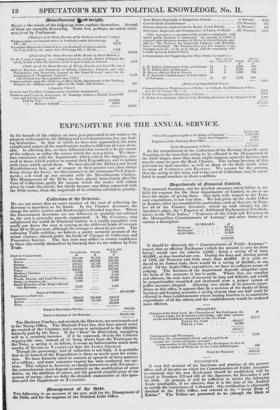eartrction of tio licbettur.
WE arc not aware that an exact account of the cost of collecting the Revenue is anywhere to be found. In the Finance Accounts, the charge for active service and Dead-weight is blended together. Where the Government Accounts are not followed, or probably not referred to, the cost is generally grossly exaggerated. A Mr. CUNDELL, who enlightened the world on Financial matters in a goodly pamphlet, very coolly put down the cost as varying on the different heads of revenue from 20 to 90 per cent, although the average is about 6; per cent. The following Table exhibits, we believe, a pretty accurate account of the actual expense, classed under the heads of Charges of Collection and Preventive Service. The last item may suffice to restore confidence to those who terrify themselves by fancying that we are undone by Free Trade.
Great Britain. Ireland.
COST OF COLLECTION. X X
Customs 708,789 87,373 Excise 834,908 100.858 Stamps 148,247 24.745 Post-office 554,494 80,793 Taxes 269,001 . ....
Hackney Coaches 3,956 .... Hawkers 8,123 ....
'Woods, Forests, and Land Revenue 23,465 .. • • Duties on Salaries, &c 1,220 ....
Small Branches of the King's Heredi- tary Revenue 1,021 Total of Collection ....
PREVENTIVE SERVICE.
Customs 296,073 124,606 Excise 25,953 37,720
Navy ....
Total of Preventive Service Total Collection of the Revenue £3,491,345
The Hackney Coaches, and we think the Hawkers, are now transferred to the Stamp Office. The Blockade Force has also been placed under the control of the Customs, and a saving is anticipated in the 160,000/. formerly paid by the Navy. If the " force" be diminished, smuggling will to a certainty increase. If it be supposed, that by the Customs stopping the sum, instead of its being drawn from the Exchequer by the Navy, a saving is to follow, it seems an hallucination much more worthy of NICHOLAS VANSITTART than Sir JAMES GRAHAM. Though the percentage cost of collection is not high, it is probable that in no branch of the Expenditure is there so much room for reduc- tion. We have formerly rated its amount at upwards of three-quarters of a million ; and more extensive inquiry has only confirmed our opi- nion. This subject is, however, so closely interwoven with Taxationz- the retrenchments must depend so entirely on the modification of some duties, on the abolition of others, and the general simplification of our system of taxing-that we defer the detailed examination of this ques- tion until the Supplement on TAXATION. Paid in 1831. Total.
796,162 935,766 172,992 635.287 269,001 3.956 8,10 23,465 1,220 1,021 .... £2,846,993 420,6;9 63,673 160,000 644,352



















































 Previous page
Previous page